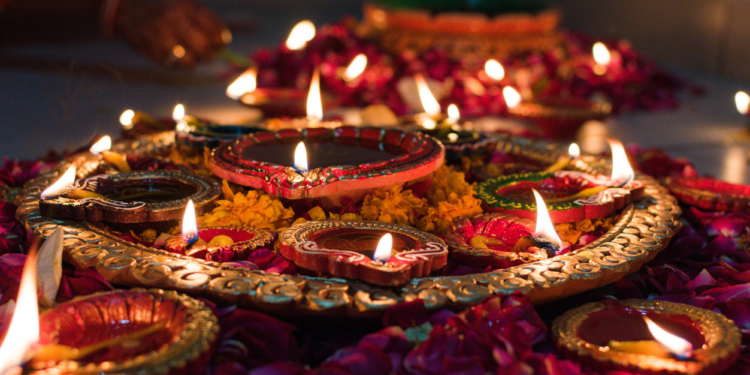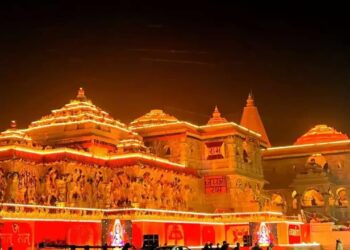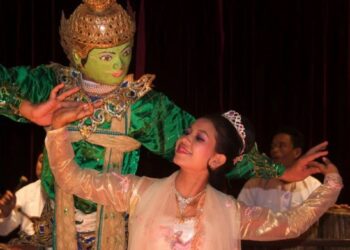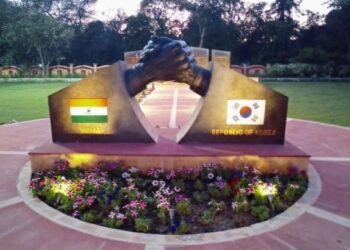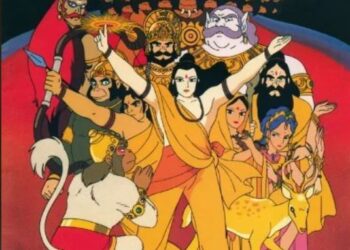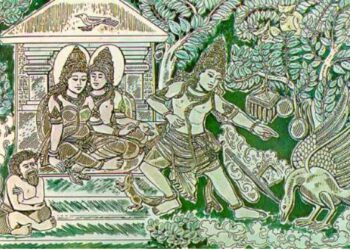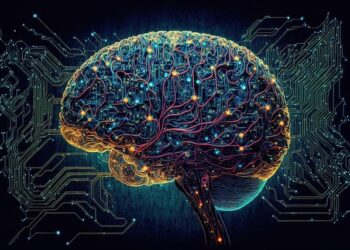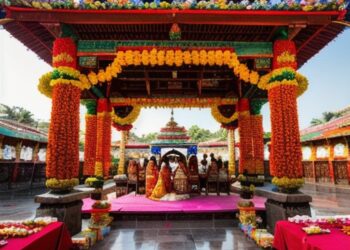India, a land steeped in a heritage that spans thousands of years, bears witness to the remarkable strength and resilience of its people. This diverse nation, with its tapestry of cultures, traditions, and customs, embodies a treasure trove of wisdom and knowledge accumulated over centuries.
Unfortunately, the neglect and gradual deterioration of this invaluable legacy had cast a shadow over India’s cultural heritage. However, a transformative shift occurred when Prime Minister Narendra Modi assumed office, breathing new life into the preservation and revitalization of India’s rich cultural tapestry.
Under his leadership, India has witnessed a cultural revival that encompasses the redevelopment of spiritual sites, the promotion of traditional knowledge and culture, showcasing India’s cultural splendor to the world, preservation of cultural assets, honoring national heroes, empowering tribal culture, and promoting cultural links. This article explores the remarkable initiatives and achievements that have contributed to India’s cultural resurgence.
Revitalizing and Restoring Spiritual Sites Nationwide in India
Under the leadership of Prime Minister Modi, India has witnessed a remarkable transformation in its spiritual sites. This era will be remembered for the revitalization of revered holy places throughout the nation. Shri Kashi Vishwanath Dham, once faded, now stands in all its glory, restored to its former magnificence.
PM Modi presided over the Bhoomipujan ceremony for the revered Shri Ram Janmabhoomi temple, signifying the reclaiming of this cherished site. The reconstruction of Kedarnath Dham, devastated by the catastrophic flash floods in 2013, serves as a testament to the government’s unwavering dedication to preserving sacred destinations.
Notable initiatives such as the Prasad and Swadesh Darshan Schemes have elevated the pilgrimage experience for devotees. Additionally, significant efforts have been made to improve connectivity to Uttarakhand’s Char Dham sites by establishing all-weather roads. The reconstruction of ancient temples in Kashmir and the rejuvenation of Ghats along the Ganga river further exemplify the government’s commitment to revitalizing spiritual sites across the country.
Reviving and Promoting Traditional Indian Wisdom and Cultural Heritage
A remarkable transformation has taken place in the revival of traditional customs and knowledge systems, resulting in profound benefits for mankind. Public investment in promoting India’s traditional medicine system has witnessed a significant surge, sparking a global interest in Ayurveda and Indian medicine.
The establishment of the WHO Global Centre for traditional medicine in Gujarat further reinforces India’s commitment to preserving and promoting traditional healing practices. PM Narendra Modi’s leadership played a pivotal role in elevating Yoga to global recognition, as evidenced by the annual celebration of the International Day of Yoga on June 21.
Recognizing their significance in combating malnutrition, the United Nations declared 2022 as the International Year of Millets upon India’s request. The National Education Policy is paving the way for studies in mother tongues, while ancient Indian languages like Sanskrit are being revitalized and nurtured. Traditional sports such as Kabaddi, Kho-kho, and Mallakhamb are experiencing a revival under the Khelo India Programme, celebrating India’s rich sporting heritage.
Celebrating India’s Cultural Grandeur on the Global Stage
In the past, there was an unusual hesitance among India’s political leaders to embrace and exhibit the country’s rich cultural heritage. However, PM Modi stands out as a leader who proudly embraces his cultural roots and seizes every opportunity to showcase India’s remarkable culture and knowledge.
Recognizing the importance of introducing India’s glorious heritage to the world, the Modi government has made a strategic decision to host meetings with distinguished guests not only in Delhi but also in various cities across the country. This approach allows visitors to experience firsthand the magnificence of Indian heritage. Notable examples include accompanying the Australian Prime Minister to Akshardham in Delhi, celebrating Diwali in Ayodhya with the First Lady of Korea, and guiding Afghanistan’s President to the Golden Temple in Amritsar.
During foreign dignitaries’ visits to India, PM Modi diligently highlights and promotes the works of local artisans, providing them with the recognition they deserve. Moreover, PM Modi presents thoughtfully chosen gifts that reflect India’s cultural legacy. For instance, he gifted Chinese President Xi Jinping a meticulously handcrafted Sirumugai Silk shawl to symbolize the historic silk connections between India and China.
Similarly, he presented President Park Geun Hye of South Korea a pashmina shawl adorned with the poetic verses of Rabindranath Tagore, exemplifying the deep respect for Gurudev among the Korean people. At the G20 summit in Bali, Indonesia, leaders from around the world were bestowed with gifts showcasing Indian art and culture, such as miniature paintings from Kangra, Mata Ni Pachedi from Ahmedabad, and Patola dupattas (scarves) from Patan. These efforts collectively serve to illuminate India’s rich cultural tapestry on a global scale.
Safeguarding the Magnificent Heritage of Indian Culture
The Modi government has surpassed its predecessors in its unwavering commitment to maintaining and safeguarding India’s multifaceted cultural treasures. Since 2014, the Ministry of Culture, through the Jatan program, has embarked on the crucial task of digitizing ten government museums across the country.
Over 300,000 ancient manuscripts have been successfully digitized under the National Mission for Manuscripts. Furthermore, the 2023-24 budget unveiled plans for the establishment of a digital epigraphy museum called Bharat Shared Repository of Inscriptions (BharatSHRI), with the first phase targeting the digitization of 100,000 ancient inscriptions.
In addition, the government has introduced several noteworthy initiatives, including the inauguration of the Rashtrapati Bhavan Museum, the establishment of the National Maritime Museum in Lothal, Gujarat, and the Pradhanmantri Sangrahalaya, which showcases the lives and legacies of all the Prime Ministers of India.
Honoring the Unsung Heroes of Our Nation
A nation’s identity is shaped by the remarkable heroes and icons it reveres, and in the realm of commemorating and honoring our national heroes, the Modi government has undertaken extraordinary efforts surpassing those of previous administrations. The Jallianwala Bagh Smarak has undergone extensive redevelopment, receiving modern amenities that ensure its significance endures. PM Modi, with deep reverence, dedicated the National War Memorial, a poignant tribute to the courageous soldiers who made the ultimate sacrifice for our nation.
Under his leadership, the National Police Memorial, a testament to the supreme sacrifices made by police personnel, was finally brought to fruition. A towering symbol of unity, the Statue of Unity, now stands as the world’s largest statue, serving as a monumental tribute to Sardar Patel’s invaluable contribution to forging a united India. Netaji Subhas Chandra Bose’s indomitable legacy has been honored with the installation of a grand statue at India Gate, perpetuating his immense impact. Recognizing the significance of Dr. Ambedkar, November 26th has been declared as “Constitution Day” in his honor.
Cultural icons like Guru Adi Shankaracharya and Maharani Ahilyabai Holkar, who dedicated their lives to promoting India’s culture and civilizational values, are being rightfully celebrated today. Through the Azadi Ka Amrit Mahotsav, countless forgotten freedom fighters have been recognized and given the respect they deserve, honoring their immense contributions to our nation’s freedom.
Empowering and Showcasing the Vibrancy of Tribal Culture
Under the leadership of PM Modi, the government has undertaken unparalleled efforts to promote and celebrate the rich tapestry of tribal culture. A significant milestone in this endeavor is the commemoration of “Janjatiya Gaurav Divas” on November 15th each year, which pays tribute to the birth anniversary of the tribal freedom fighter Birsa Munda. Recognizing the valor and patriotism of tribal individuals, PM Modi has sanctioned the establishment of 10 Tribal Freedom Fighters Museums. These museums serve as platforms to acknowledge and exhibit the remarkable cultural heritage of tribal communities.
To ensure the preservation of tribal knowledge and heritage, a Searchable Tribal Digital Document Repository is being developed. This repository will house a vast array of research papers, books, reports, documents, folk songs, photos, and videos related to tribal culture. It will provide valuable insights into the diverse traditions and practices of tribal communities.
Furthermore, the Adi Mahotsav festival has been introduced at both the national and state levels. This festival serves as a grand celebration of tribal culture, showcasing their unique traditions, art forms, crafts, and cuisine. It offers a platform for tribal artisans and performers to exhibit their skills and talents, fostering recognition and appreciation of their contributions.
Through these initiatives, the government, under PM Modi’s guidance, is empowering and highlighting the vibrant essence of tribal culture, ensuring its preservation and fostering a deeper understanding and respect for the tribal communities of India.
Strengthening Cultural Bonds and Reviving Traditions
PM Modi’s remarkable efforts have reinstated the essence of India’s diverse religious facets and rich traditions. By inaugurating the world Sufi Forum, he spreads the message of peace embraced by Islam. Special emphasis is placed on celebrating India’s Sikh heritage, with recognition of the exemplary service spirit of the Sikh community. Notable examples of this dedication include the opening of the Sri Kartarpur Sahib corridor and the observance of ‘Veer Bal Diwas‘ on December 26th, commemorating the martyrdom of Sahibzade.
Under the Modi-led government, numerous cultural centers have been established worldwide to disseminate the teachings of Lord Buddha. The promotion of the Buddhist Circuit through the Swadesh Darshan scheme has been ongoing since 2015. In a gesture of solidarity, PM Modi visited St Anthony’s Church in Colombo, which had previously been targeted by terrorists, to preserve the cultural ties of Christianity.
In his radio address, “Mann Ki Baat,” the Prime Minister encourages fellow countrymen to explore India and familiarize themselves with the diverse cultures and languages of each state. Recently, PM Modi urged the youth to participate in the ‘Vibrant Village Program’ (VVP), which involves visiting border villages. By organizing events such as ‘Kashi Tamil Sangamam‘ and ‘Saurashtra Tamil Sangamam,’ PM Modi is revitalizing age-old cultural links, celebrating the relationship between Tamil Nadu and Kashi, as well as the shared history of Saurashtra and Tamil Nadu.
With the vision of “Ek Bharat, Shreshtha Bharat,” PM Modi has tirelessly woven together the diverse tapestry of India. Landmarks from Kashmir to Kedarnath, Kashi Vishwanath to Somnath, and Ayodhya to Ujjain bear witness to this incredible journey. A spiritual renaissance is taking place in the country, for which PM Modi deserves credit. The citizens, particularly the younger generation, are rediscovering, acknowledging, and appreciating India’s rich cultural legacy. As a result, a New India is emerging—one rooted in its values, proud of its identity, and gratified by the recognition of its vibrant culture.

